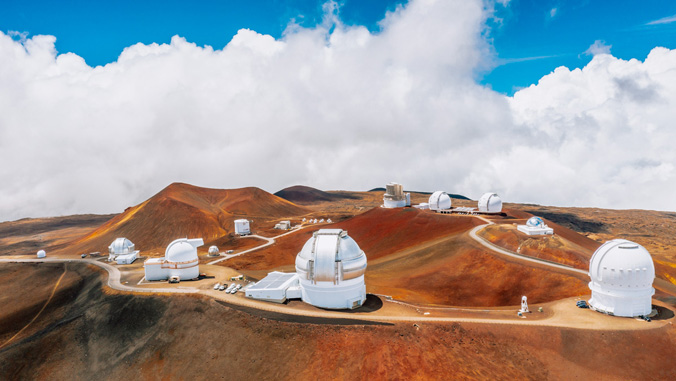
The extent of astronomy’s economic impact on the state goes well beyond the standard economic measurements when “spillover” effects are included, according to the University of Hawaiʻi Economic Research Organization (UHERO) report on astronomy in Hawaiʻi.
UHERO estimates astronomy had a total economic impact (output of goods and services) of $221 million in 2019 while supporting the employment of 1,313 residents. Nearly half of that impact was on Hawaiʻi Island, where astronomy was responsible for $102 million and 611 jobs.
For the first time, UHERO also examined the “spillover” effects of astronomy, the additional benefits and costs not normally accounted for. Here are the three types of spillover effects along with examples identified in the report as related to astronomy in Hawaiʻi:
- Market—the value generated by market-based mechanisms that are not captured by the people or organizations producing the product or undertaking the activity.
- Example: development of the precision manufacturing industry to serve astronomy that now serves other sectors of the state economy.
- Network—the additional value one economic sector may generate in another sector.
- Example: visitors coming to Hawaiʻi or extending their stays to visit Maunakea and Haleakalā.
- Knowledge—the wider benefits of knowledge when used for purposes beyond the initial research and development program.
- Example: the UH Institute for Astronomy, through research initiatives throughout the decades, is now an international leader in development of technology including infrared controller electronics, Giga-Pixel cameras and adaptive optics.
“Astronomy is embedded in our local communities, and that is unique compared to many high-tech sectors,” said Greg Chun, executive director at UH Hilo Center for Maunakea Stewardship. “This report demonstrates the incredibly beneficial ripple effect that astronomy, and really public-funded research, has on our state.”
The effect from spillovers can last decades, according to UH Mānoa Assistant Professor Steven Bond-Smith, the lead UHERO researcher on the report.
“Take knowledge spillovers for example where research projects from decades ago are still having a positive impact on our state,” said Bond-Smith. “The standard measure of economic impact from research in any one year will under-estimate the true economic value.”
Beyond the spillover effects and the economic impact on statewide output, astronomy activities generated $68 million in labor income and $10 million in state taxes. Astronomy is just one part of the total economic impact the UH 10-campus system has on the state. According to a 2021 UHERO report that looked at fiscal year 2020, Hawaiʻi’s public higher education system had a $3.6 billion impact on the state economy and supported more than 22,500 jobs.

